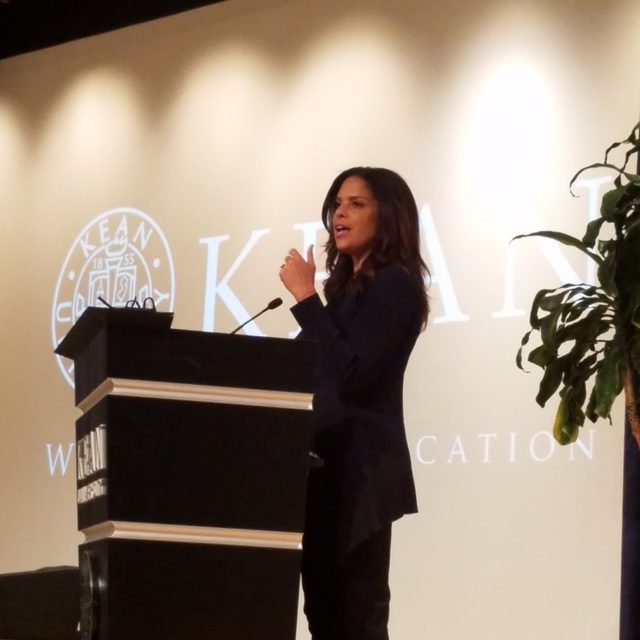By Jennifer Padilla | Published by April 13, 2018

stories. Photos by Joshua Rosario.
Journalist, documentarian and producer Soledad O’Brien was the second speaker to launch Kean University’s Distinguished Lecture Series on Tuesday, March 20— discussing the #MeToo movement and what women face when coming forward with sexual harassment in the workplace.
After posing for a picture with a group of Kean students at a pre-event, O’Brien joked, “See? I didn’t ‘accidentally grope’ somebody; no one said, ‘someone grabbed my butt’ [while taking this photo].”
She began her speech with her first experience of sexual harassment, which was while doing a live stand up at a San Francisco sports bar– she was groped as she stood in front of a group of drunk sports fans.
“I told my boss, and I laughed it off, and he laughed it off,” said O’Brien. “He said, ‘it was your fault, you know better than to stand in a bar with your rear end exposed’.’’
The StarFish Media CEO shared her first #MeToo moment— attending a fancy dinner and sitting with reporters from CBS: “I was wearing a strapless, black dress… and a very, very famous anchorman began rubbing my shoulders and my chest,” she said. “I remember how embarrassed I was, and how ashamed I was.”
But after twisting her body to discreetly interrupt the shoulder rubbing, O’Brien said the most embarrassing thing she had to do was “Smile really, really hard” to pretend in front of everyone that everything was fine– she just wanted to be hired.
“The effort it took for me to telegraph that ‘this was no big deal’– I look back at that with embarrassment,” said O’Brien. “Why does the discomfort always fall on the woman who’s being touched?”
The mother of four said she wouldn’t have obtained her job if she had assertively tried to stop the anchorman from touching her. #MeToo is trying to figure out how to give voice and power back to women in these scenarios, added O’Brien.
“It can’t remain just a hashtag,” she said. “And it can’t even remain as a conversation starter; we have to figure out what is the action. What are we trying to change?”
A former co-worker had asked O’Brien for advice 20 years ago regarding sexual harassment at her place of work: “I tried to tell her the realest version of what would happen if she went to Human Resources: she will never work on TV again.”
HR is often sided with the high-performing employees; they want to protect the company’s money and reputation, added O’Brien. “You will always be known as the woman who complained, and they will hold that against you.”
Some forms of harassment are considered worse than others; for example, rape, or touching a “more unacceptable” body part, instead of her shoulders– thus bringing up the topic of a spectrum: “It felt yucky [the anchor rubbing on her shoulders], but he wasn’t hurting me. So what should have happened to him? What should be the punishment? I don’t know.”
O’Brien said that social media has given very long-standing problems some needed attention, however, what has to happen to make real tangible change is “confusing.”
“It’s clear that this is not new behavior, and something many people have just come to accept as ‘normal’,” said Miranda Brenton, Kean communications student. “The systematic abuse has to stop, and result in real, institutional changes where cultures of abuse and silence are no longer tolerated.”
Kean computer science major, Jose Varela, said what he learned from the event is that women have to constantly prove themselves in ways their male peers don’t have to.
The diminishment of power and retaliation against women is a “Civil rights struggle,” O’Brien said, in which she hopes will not continue to be a topic of discussion a decade from now.

You must be logged in to post a comment.